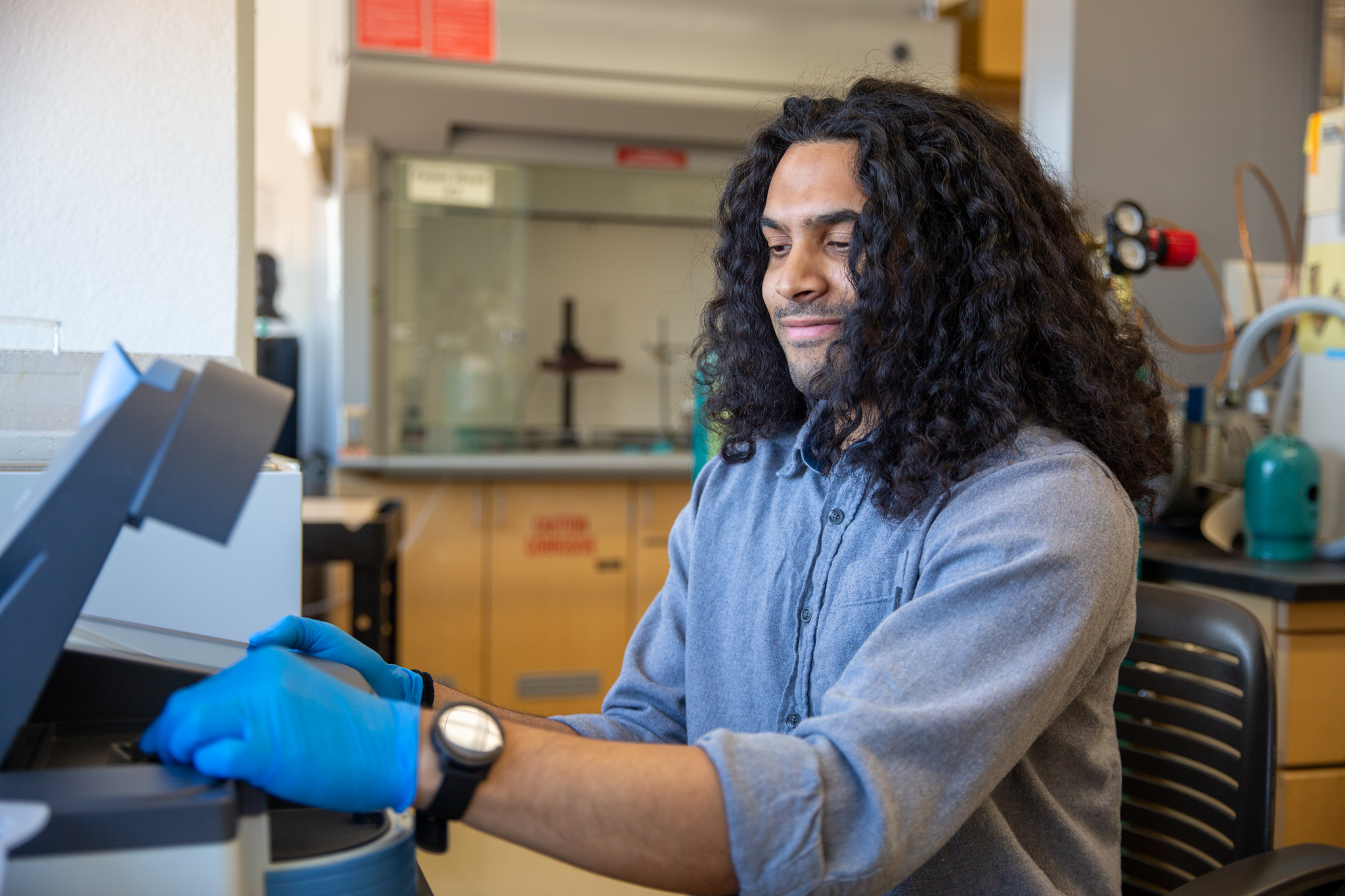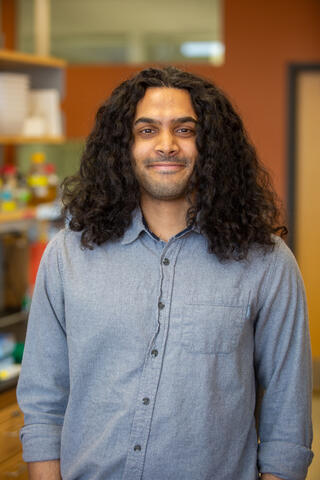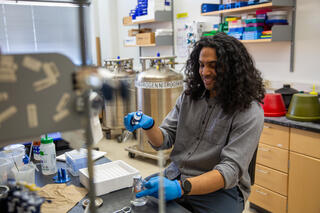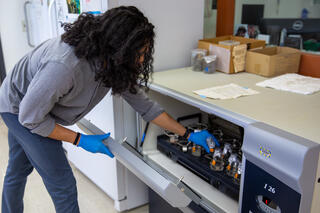
Our graduate students and postdoctoral researchers play an enormous role in the transition to a sustainable, resilient, and affordable energy future that is centered on social and economic equality. From lab experiments to field work to classrooms, these leaders of today and tomorrow are our catalysts for energy discovery.
In this series, we learn more about what inspired these talented researchers, what brought them to their field of study, and the questions that drive their work at the Great Lakes Bioenergy Research Center (GLBRC).
Today we spoke to Daven Khana, a Ph.D. candidate in the DAN Lab led by Daniel Amador-Noguez at the University of Wisconsin-Madison. Daven obtained his bachelor's in microbiology and genetics at the University of Georgia. Currently, he studies metabolism and bioenergy.

Tell me about your background:
I got my bachelor's degrees in microbiology and genetics at the University of Georgia. At that time, I was working in an entomology/genetics lab and I did an internship at the Bigelow Lab for Ocean Sciences in Maine. For two years after graduation, I worked in a veterinary pathology lab with Jamie Tarigo at the University of Georgia. I was kind of all over the board with regards to the type of science I wanted to do. I applied to UW along with a bunch of different other schools, specifically focusing on bioengineering programs. In 2018, I got into Daniel Amador-Noguez’s lab (DAN Lab) in the microbiology doctoral training program.
What drew you to the DAN Lab?
A lot of the labs I was rotating in were involved with the GLBRC and focused on bioenergy. I was drawn to the DAN lab because I liked his focus on metabolism and the chemical transformation of nutrients into energy, which I thought was pretty unique. Other labs I had been in before approached bioengineering through genetic engineering or protein engineering. I thought the DAN lab’s focus on the metabolism side of bioengineering was unique. Also, Daniel was a great PI (principal investigator). He's very personable.
What sparked your passion for research?
I was doing a research internship at the Bigelow Lab for Ocean Sciences and a woman from this company called Ecovative gave a spiel about using the mycelium of fungi to replace Styrofoam. She would grow fungi in these molds and then you could use them as buoys in the ocean. They don't last as long as Styrofoam, but they're biodegradable. That really introduced me to the concept of bioengineering and using bacteria, fungi, and yeast to replace the chemical industry and provide sustainable alternatives.
Could you tell me a bit about your research?
We focus on a specific bacteria that converts sugar to ethanol really efficiently. In the process of converting sugar to ethanol, there are a lot of intermediate steps to get to that ethanol. We focus on those intermediate steps, specifically from sugar to other end products we care about. In this case, we care about a group of molecules called isoprenoids, which can be used as biofuel precursor molecules, and we care about the process this bacteria uses to convert sugar to isoprenoids.
How does this connect to bioenergy?
When we say the word bioengineering, we often think about sustainability by using renewable resources to make biomolecules and biofuels. We are taking renewable sources like switchgrass and converting them to these isoprenoid molecules using a bacteria called Zymomonas mobilis. We are trying to not only make this pathway more efficient at making isoprenoids but we are also trying to find bottlenecks and how we can improve it by focusing on metabolism. What specific steps in the pathway do we need to fix rather than fix everything?

You recently published a paper in an American Society for Microbiology Journal on this research. Tell me more about this paper and your findings.
The paper was focused on the bacterium Zymomonas mobilis and the metabolic pathway known as the methylerythritol phosphate, or MEP, pathway. The MEP pathway is responsible for making isoprenoid molecules, which play many biological roles. However, isoprenoids can also be used as biofuels and biofuel precursor molecules. Thus, some bacteria have the potential to produce isoprenoid-based biofuels from renewable resources, which provides an environmentally sustainable alternative to fossil-fuel products. So, to assess Zymomonas mobilis as an industrial producer of isoprenoids, we sought to identify any potential bottlenecks in the MEP pathway. Through a systematic approach, we overexpressed every enzyme one-by-one in the MEP pathway and focused on changes to metabolism to look for bottlenecks.
We found that the first step in that pathway was the biggest and most significant bottleneck because when we overexpressed that enzyme, we saw the largest increase in MEP pathway metabolite levels, indicating an increase in carbon input into the pathway. We also identified two additional bottleneck steps in the MEP pathway, which are particularly interesting because they involve some accessory proteins that are very sensitive to oxygen. Finally, when we overexpressed all three of these enzymes, we observed no more bottleneck steps in the MEP pathway, suggesting more carbon entering the MEP pathway and thus higher isoprenoid generation. By revealing key bottlenecks within the MEP pathway of Z. mobilis, this study will aid future engineering efforts aimed at developing this bacterium for industrial isoprenoid production.
Writing the paper was a challenge. I'm not the greatest at writing, but my PI was really communicative about what needed to be fixed. He's a really good writer himself, so he facilitated that process very well.
What is your next step in this research?
So the next step involves not just overexpressing all these enzymes as much as we can, but tuning expression. How can we find the most optimal expression of these enzymes?
Another step involves seeing if we can overexpress proteins that are accessory to the MEP pathway to see if that can help Zymomonas mobilis increase carbon into the MEP pathway. I would say those are the two major ones.
Describe a typical week at work.
Typically a week will begin with planning my experiments –figuring out when I need to prepare glassware or when I need to do data analysis. In between that, we have some undergrads in the lab, so I find activities/lab work for them. The week always begins with lots of planning and ends with lots of experiments. My work typically starts with wet lab (experimental lab work handling chemicals and instruments directly) and experiments, analyzing that data, and adjusting your next experiments based on those results.

What sparks joy in your work?
You can never get enough of those epiphany moments when you're doing science – when you finally figured it out, this is how this works, or this is how I do this protocol. A lot of times in grad school, and life in general, you put so much work into optimizing this one thing or analyzing these specific data. Sometimes that work leads to failure, but sometimes it leads to those epiphany moments where you finally figure it out.
What is something you are proud of in your career so far?
I'm really proud of the critical thinking skills grad school has taught me. I can think critically and not get as overwhelmed or scared about a really big problem. Grad school has really taught me the skills and ability to take complex problems, break them down into their individual components, and tackle them one at a time, whether that be in the sciences or just everyday life.
You have been in the DAN lab since 2018 and are expected to finish up your Ph.D. by the end of the year. What do you want to do after graduation?
Sleep. I will sleep for a thousand years. I will definitely take some time to see some family and friends. I haven't narrowed down exactly what I want to do job-wise, but I'd like to keep using the skills I gained during my PhD. I don’t want to abandon science. We do a lot of liquid chromatography-mass spectrometry in our lab. Working in the DAN lab was a very unique opportunity to work with that technology. I hope to keep using that technology. I would love to continue working in the field of bioenergy, but I know that I could apply my skills to anything I want.
Slow down and take things one at a time. We put a lot of pressure on ourselves to finish everything as soon as possible... Take time to breathe.
Daven Khana
What advice would you give to future researchers?
To slow down and take things one at a time. We put a lot of pressure on ourselves to finish everything as soon as possible. Something I've learned is if we take time to breathe and analyze problems with a lot of scrutiny, we can break down those problems into their constituent parts, and then nibble at them little by little. If someone had told me that, it would have been very helpful when I first started.
What do you like to do for fun outside of research?
I am very hobby driven. Madison is really great for biking. I like being able to take advantage of the bike trails. I like to bake and I'm learning how to do embroidery and paint. Basically, stuff that's not 100% science related.